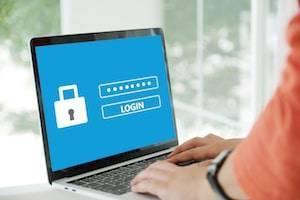The Intersection of Cybersecurity and Divorce
 Advancements in technology have changed the landscape of life for most people around the world, and the dynamics of marriage have certainly been altered due to the communication and information storage opportunities couples can use to share their lives. While this sharing is wonderful when a relationship is intact, sharing creates very real and significant detriments, if divorce is pursued.
Advancements in technology have changed the landscape of life for most people around the world, and the dynamics of marriage have certainly been altered due to the communication and information storage opportunities couples can use to share their lives. While this sharing is wonderful when a relationship is intact, sharing creates very real and significant detriments, if divorce is pursued.
Couples routinely share passwords, accounts, link devices and use smart technology throughout their homes to coordinate their lives in a more integrated way. In fact, the integration of technology in most marriages is so complete, if divorce does come, many are taken unaware when the other spouse uses this access against him or her.
People, understandably, tend to associate cybersecurity concerns with outside companies or government agencies, not families, and certainly not a spouse; however, depending on how acrimonious or accepting a spouse is of the situation, a pending divorce will move some to take drastic measures to gain the upper hand.
Even when such impermissible actions are highly unlikely, being cautious and taking steps to restrict a soon-to-be former spouse from viewing emails, call logs and text messages is an important literal and symbolic step to moving on post-divorce.
Consider how digital information can be used to bolster a divorce case and methods of protecting one's digital privacy in the wake of a divorce announcement.
Using Private Information in a Divorce
People leave a digital imprint almost everywhere they go and in everything they do. From Internet searches, texting, and social media, a spouse in the middle of divorce has a wealth of information at his or her fingertips that could potentially impact child custody decisions or property division settlements, depending on the spin given to them in Court.
Posts or information related to dating, travel, social drinking, or large purchases can all be used to put the user in a negative light. This type of evidence can create an environment in which the denigrated spouse would be moved to agree to an unfavorable settlement to avoid more exposure, or the loss of marital assets or parenting responsibilities if wrongdoing was convincingly alleged.
One important factor to keep in mind, though, is that the interception of electronic data or the recording of conversations without the consent of all parties is illegal. Further, any evidence collected through these illegal acts is not admissible in Court. Consequently, if eavesdropping or surveillance occurred, proving this fact in Court is crucial to protecting one's rights against disclosure of private information.
Methods of Protection
First and foremost, passwords need to be changed and potentially new accounts created to ensure that communications are entirely out of the reach of the other spouse. Phones should be password protected or restricted via biometric technology that uses fingerprints to determine who has access. Taking things a step further, an especially cautious spouse may cease all social media postings and most online activity until the divorce is finalized.
Encrypting emails and texts and/or limiting phone calls and texts to close family members may also be prudent. In addition, apps are on the market that limit the ability of others to view digital activity through the use of an extra layer of security that makes intercepting and tracking communications and transmissions more difficult.
While taking these measures may seem extreme, predicting a spouse's behavior in the emotional throes of divorce is extremely difficult, and the potential negative consequences are rarely worth rejecting the assumptions these measures require spouses to make.
Get Legal Advice
You can never fully predict how a spouse will react to the stresses of divorce, and taking precautions to protect online accounts and smartphone devices from snooping is a big part of achieving a good outcome.
Skilled Rolling Meadows family law attorney Nicholas W. Richardson understands the implications and pivotal factors of divorce, and he can help you find a resolution that works for you and your family. Contact our office at 847.873.6741 for a free initial consultation.
Sources:
https://www.cnbc.com/2018/06/15/financial-times-divorce-lawyers-warn-warring-couples-to-unsync-iphones.html
Introducing The Law Office of Nicholas W. Richardson
Nicholas W. Richardson is an experienced divorce lawyer and mediator whose comprehensive legal knowledge, commitment to clients and reputation for results bring lasting solutions to your problems.






